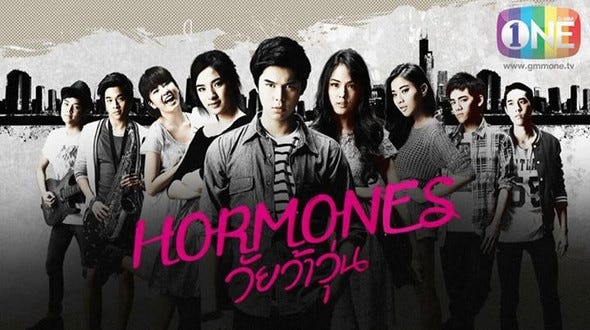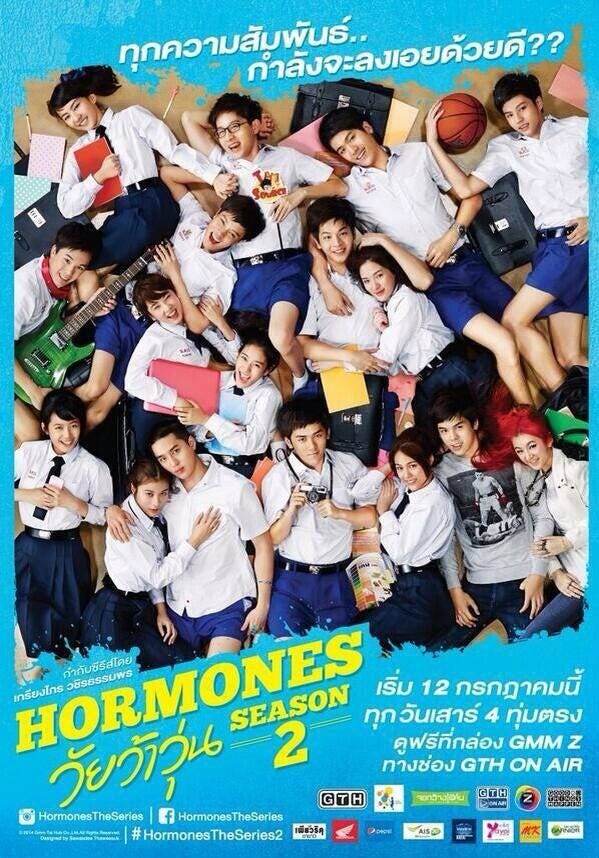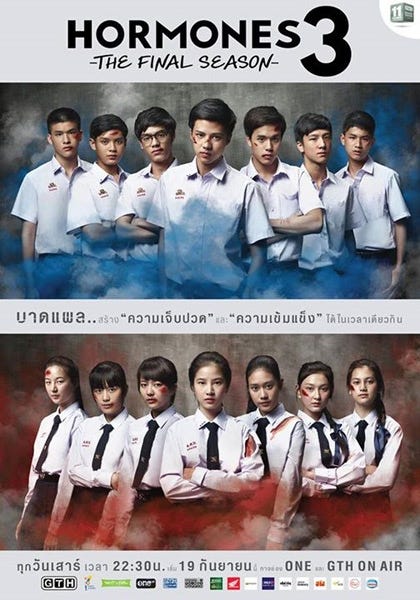Hormones the Series: A Critique on Media Censorship

When you think of a teen drama, you’d probably expect something that is set in a school with an innocent love story happening. In the first twenty seconds of its trailer, the Thai drama Hormones the Series seems to fit the aforementioned description of a teen drama. But after those first twenty seconds, the drama exposes itself as a major deviation from that description.
But despite being unconventional, Hormones has developed a significant fan base not only in Thailand, but also in other parts of Asia. The bold depiction of teenage life is able to provoke discussions on censorship in media, especially in relatively conservative Asia.
The Drama’s Unconventional Structure
Hormones was directed by Songyos “Yong” Sugmakanan and produced by film studio GMM Tai Hub (GTH, now GDH 559) and Nadao Bangkok. It lasted 3 seasons which aired between 2013 to 2015. Loosely inspired by Skins UK, the drama set in fictional Nadao Bangkok College and chronicles the stories of its diverse student body.
As mentioned, this drama’s plot is unconventional. It tackles different controversial aspects of teenage life that are not normally discussed, such as peer pressure, broken families, sexual activity, and substance abuse.
As a result, the method of the drama’s storytelling also differs from a typical series. Instead of having just a single plot for the entire season, each season features multiple small storylines to emphasize the diverse nature of Nadao Bangkok College’s student body.
At first glance, this structure of storytelling may seem disorganized and confusing. But this is addressed by putting emphasis on a particular character per episode. At the start of an episode, instead of simply presenting the events of the previous episode, this segment presents the previous events relevant to the featured character of that episode. An actual episode presents the specific conflict a character is facing and how that character could possibly resolve that conflict.
The Drama’s Controversial Portrayal of Teenagers
Despite its success, Hormones was not immune from criticism. As expected, its portrayal of teenage life became a major point of scrutiny. Some controversial portrayals of teenagers included the following: smoking and drinking in uniform, gang violence in uniform, engaging in sexual activity inside school grounds, and homosexual relationships (in a heteronormative society).
However, these portrayals are not necessarily wrong because there was no romanticizing of events. Instead, the characters involved in these portrayals faced very realistic consequences of their actions. As a result, these characters somehow grow and learn from their experiences.
Regardless of a person’s stance on these controversial portrayals, what is certain is that the series was able to spark discussions on media censorship.

To address the controversies of the first season, Hormones Season 2 (2014) featured the imaginary drama Ruk Krum Krim in the first episode. This drama within the drama is a symbolism of the first season, and Episode 1 of Season 2 depicts the different reactions to that drama. Some elements consistent between Hormones the Series and Ruk Krum Krim are the controversial portrayal of teenagers and the blurring out of certain objects such as alcohol bottles and cigarette packs.
The imaginary Ruk Krum Krim was also able to show contrasting reactions of parents to the drama. The contrasting reactions can also be associated to the contrasting reactions to Hormones. What’s clear is that both Ruk Krum Krim and Hormones provoked disturbing feelings to both teenagers and their parents. But how people address that provocation is something worth comparing.
Probably the fastest way to address these provocative emotions is to simply censor the content from younger audiences. It spares adults from the responsibility of explaining to these younger audiences the events that happen in the series.
However, censorship has a major flaw. If it’s done on a personal level, adults would have no guarantee that the younger audiences would absolutely not find a way to see the content. As shown in Season 2’s Episode 1, teenagers still found ways to watch Ruk Krum Krim despite the censorship they are put by their parents. If censorship is done on an institutional level, this would cause issues in terms of freedom of expression.
What GTH and Nadao Bangkok were able to do with Hormones is to provide a better alternative to censorship when it comes to dealing with these taboo topics. Rather than simply censoring the content from younger audiences, they took these topics and found the best ways to address them by integrating it to the series. Since teenagers will be able to see it anyway, why not address the issue in the drama?
Instead of simply using these controversial portrayals of teenagers as a mere plot device, GTH and Nadao Bangkok were able to show the possible outcomes of certain actions. Therefore, if younger audiences were to watch the series, the events could serve as warnings for them to avoid doing certain things.
What helps Hormones deliver this narrative much better are the stellar performances of the actors and actresses, which have become a trademark of Nadao Bangkok. These people were able to tell the story of their characters in a way that makes audiences empathize with the character. For teenage audiences, there’s a feeling that these characters could have been them. With that appeal, the purpose of addressing these taboo topics to younger audiences is achieved better.
Where Do We Draw The Line?
With the commercial success of Hormones, people might have a misconception that they just need to write something about a controversial topic and it would become successful. But they must never forget the two things that makes Hormones more than just a controversial series.
First, it did its best to actually address these controversial topics through the characters and their respective story arcs. Second, GTH and Nadao Bangkok were already more cautious in the sequels by integrating more explicit warnings and trigger warnings whenever something controversial occurs in an episode.
If future production houses are able to take these two points into consideration, a paradigm shift can happen when it comes to dealing with these controversial topics. From outright censorship, there could be more open discussions which could further address the issue more than how a production did.

